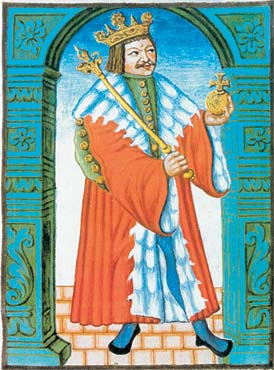<Back to Index>
- Historian James Anthony Froude, 1818
- Composer Ethel Mary Smyth, 1858
- King of Bohemia George of Kunštát and Podĕbrady, 1420
PAGE SPONSOR

George of Kunštát and Poděbrady (23 April 1420 – 22 March 1471), also known as Poděbrad or Podiebrad (Czech: Jiří z Poděbrad; German: Georg von Podiebrad), was King of Bohemia (1458 – 1471). He was leader of the Hussites.
George was the son of Victor of Kunštát and Poděbrady, a Bohemian nobleman, one of the leaders of the Orphans or Utraquists, the more moderate faction of the Hussites during the Hussite Wars. At the age of fourteen, George himself took part in the Battle of Lipany, which marked the downfall of the more radical Taborites.
Early in life, as one of the leaders of the Hussite party, he defeated the Austrian troops of the King Albert II, who had succeeded King Sigismund as King of Bohemia, Germany and Hungary. George soon became a prominent member of the Hussite party, and after the death of Hynek Ptáček of Pirkstein its leader.
King Albert was succeeded by his posthumously born son Ladislaus, during whose reign Bohemia was divided into two parties: the party faithful to Rome, led by Oldřich of Rosenberg (1403 – 1462), and the Hussite party, led by George.
After various attempts at reconciliation, George sought a military decision. He gradually raised an armed force in north - eastern Bohemia, where the Hussites were strong and where his ancestral castle Litice was situated. In 1448, he marched this army, about 9000 strong, from Kutná Hora to Prague, and obtained possession of the capital almost without resistance.
Civil war, however, broke out, but George succeeded in defeating the nobles who remained faithful to Rome. In 1451 the emperor Frederick III,
as guardian of the young king Ladislaus, entrusted Poděbrad with the
administration of Bohemia. In the same year a diet assembled at Prague
also conferred the regency on George. The
struggle of the Hussites against the papal party continued
uninterruptedly, and the position of George became a very difficult one
when the young king Ladislaus, who was crowned in 1453, expressed his
pro-Roman sympathies, though he had recognized the compacts and the
ancient privileges of Bohemia. In 1457 King Ladislaus died suddenly and
some voices accused George of having poisoned him. (Research in 1985
gave acute leukemia as the cause of death.) On 27 February 1458 the estates of
Bohemia unanimously chose George as king. Even the adherents of the
papal party voted for him, some in honour of his moderate policies,
some out of deference to popular feeling, which opposed the election of
a foreign ruler. George attempted to rule in a moderate manner based on the Compacta of Prague. He won the loyalty of some Catholics, but had to contend with the opposition of Pius II,
which proved one of the most serious obstacles to Poděbrad's rule. Pius
declared the Compacta null and void in 1462 and wished George to
consent to this. George rejected this demand but endeavoured to curry
favour with the Roman See by punishing the more extreme Hussites. George
attempted to secure peace with Rome by a radical suggestion, which some
consider to have been a proposal before its time of a European Union. He
proposed a treaty among all Christian powers, with Germany (then
including Bohemia), France, and Italy and its princes the founding
members, but others, especially the Hispanic powers, joining later. The
member states would pledge to settle all differences by exclusively
peaceful means. There was to be a common parliament and other common
institutions and supranational insignia. George couched the proposal in
Christian terms ("Europe" is not explicitly mentioned) as a way to stop
the "abominable Turk" who had conquered Constantinople in 1453. He sent Leo of Rozmital on a tour of European courts with a draft treaty of The message of peace to promote this idea. George hoped that the treaty would come into effect in 1464. That
did not happen. All George's endeavours to establish peace with Rome
proved ineffectual, although Pius II's plan of a crusade against
Bohemia remained unexecuted. After Pius' death in 1464, George attempted to negotiate with the new Pope, Paul II but Paul proved to be an equally determined opponent. George
made enemies among the nobles of the papal party, who assembled at
Zelená hora (Grüneberg) on 28 November 1465 to voice their
grievances and conclude an alliance against the king. The confederacy
was from its beginning supported by Pope Paul and on 23 December 1466
the Pope excommunicated George and pronounced his deposition as king of
Bohemia, releasing all subjects of the Bohemian crown from their oaths
of allegiance to George. Emperor Frederick III, and King Matthias of Hungary, George's former ally, joined the insurgent Bohemian nobles. King Matthias conquered a large part of Moravia, and was crowned King by the papal party in the Moravian ecclesiastical metropolis Olomouc, as king of Bohemia on 3 May 1469. George
was successful against Matthias but, contrary to the wishes of his
followers, came to an agreement with the Hungarian king in 1470. He died on 22 March 1471 and his followers chose Vladislaus II, the son of the Polish King, as his successor to continue the fight against Matthias.